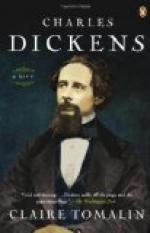Meanwhile, in the autumn of 1869, he had gone back to the old work, and was writing a novel, “The Mystery of Edwin Drood.” It is a good novel unquestionably. Without going so far as Longfellow, who had doubts whether it was not “the most beautiful of all” Dickens’ works, one may admit that there is about it a singular freshness, and no sign at all of mental decay. As for the “mystery,” I do not think that need baffle us altogether. But then I see no particular reason to believe that Dickens had wished to baffle us, or specially to rival Edgar Allan Poe or Mr. Wilkie Collins in the construction of criminal puzzles. Even though only half the case is presented to us, and the book remains for ever unfinished, we need have, I think, no difficulty in working out its conclusion. The course pursued by Mr. Jasper, Lay Precentor of the Cathedral at Cloisterham, is really too suspicious. No intelligent British jury, seeing the facts as they are presented to us, the readers, could for a moment think of acquitting him of the murder of his nephew, Edwin Drood. Take those facts seriatim. First, we have the motive: he is passionately in love with the girl to whom his nephew is engaged. Then we have a terrible coil of compromising circumstances: his extravagant profession of devotion to his nephew, his attempts to establish a hidden influence over the girl’s mind to his nephew’s detriment and his own advantage, his gropings amid the dark recesses of the Cathedral and inquiries into the action of quicklime, his endeavours to foment a quarrel between Edwin Drood and a fiery young gentleman from Ceylon, on the night of the murder, and his undoubted doctoring of the latter’s drink. Then, after the murder, how damaging is his conduct. He falls into a kind of fit on discovering that his nephew’s engagement had been broken off, which he might well do if his crime turned out to be not only a crime but also a blunder. And his conduct to the girl is, to say the least of it, strange. Nor will his character help him. He frequents the opium dens of the East-end of London. Guilty, guilty, most certainly guilty. There is nothing to be said in arrest of judgment. Let the judge put on the black cap, and Jasper be devoted to his merited doom.
Such was the story that Dickens was unravelling in the spring and early summer of 1870. And fortune smiled upon it. He had sold the copyright for the large sum of L7,500, and a half share of the profits after a sale of twenty-five thousand copies, plus L1,000 for the advance sheets sent to America; and the sale was more than answering his expectations. Nor did prosperity look favourably on the book alone. It also, in one sense, showered benefits on the author. He was worth, as the evidence of the Probate Court was to show only too soon, a sum of over L80,000. He was happy in his children. He was universally loved, honoured, courted. “Troops of friends,” though, alas! death had made havoc among the oldest,




